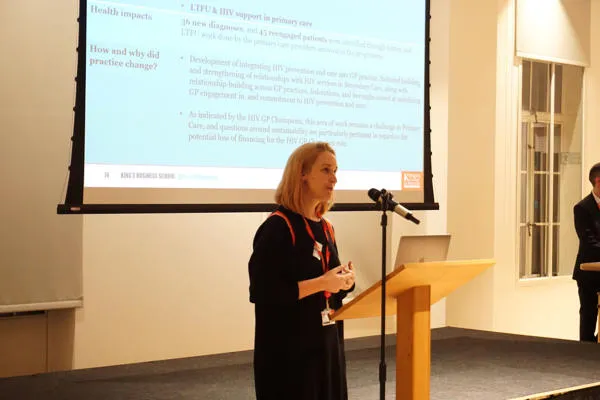Many of these interventions were not new. But this programme ensured that the different interventions operated alongside each other in a more coordinated and systematic way. This was very much welcomed by HIV specialist staff and wider stakeholders including patients and there is real hope that the programme can lead to sustainable improvements in HIV services in South London and other areas.
Dr Alec Fraser, King's Business School
20 April 2022
New social impact funding model has improved the effectiveness of HIV testing scheme south London
Elton John AIDS Foundation programme was effective in finding previously unknown cases of HIV

Research by King’s College London has found that an Elton John AIDS Foundation funded programme in Southwark, Lambeth and Lewisham has been effective in identifying previously undiagnosed cases of HIV and re-engaging HIV positive patients that had been ‘lost to follow-up'. It was the first HIV testing and engagement programme in the world to use a social impact bond, a type of funding structure that pays providers for particular health or social outcomes. The programme, which was launched in 2018, concluded in December 2021 and supported interventions through hospitals, general practices and community organisations.
Dr Alec Fraser (King’s Business School), Dr Clare Coultas (School of Education, Communication and Society) and Dr Alexis Karamanos (London Borough of Hackney and City of London) found that the stable funding model provided by the SIB was welcomed by many actors. It gave hospitals, GPs and community organisations greater confidence to commit resources to extending testing into healthcare settings and communities that are not traditionally the focus for HIV initiatives.

As part of the programme, local hospital Emergency Departments have been testing all consenting patients, regardless of whether it was clinically relevant to their treatment. Hospitals also improved their systems to re-engage HIV patients who had ceased treatment.
In the primary care sector, the team found that the SIB prompted several initiatives, including new opt-in HIV testing programmes at individual GP practices and monthly meetings of GP HIV Champions to develop ideas and share learning. In one borough, these discussions resulted in the introduction of stigma reduction training for administrative staff and other educational events. There were also greater efforts to prevent HIV-positive patients from ‘falling through the cracks’ after diagnosis.
Finally, in the community care sector, the researchers found that the programme and increased SIB funding gave organisations respite from the short-term nature of many existing funding streams . The SIB was structured to offer up-front funding, not only payment by results, which enabled the organisations to invest in training and equipment so that they could conduct testing in non-clinical settings and build longer-term relationships with clients and support them into HIV treatment.
Service Evaluation of the Elton John AIDS Foundation Zero HIV Social Impact Bond
Download the full report from Dr Alec Fraser, Dr Clare Coultas and Dr Alexis Karamos.



